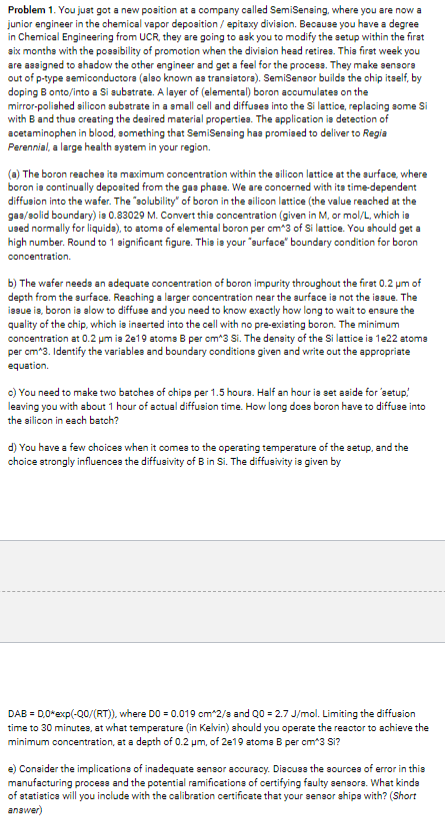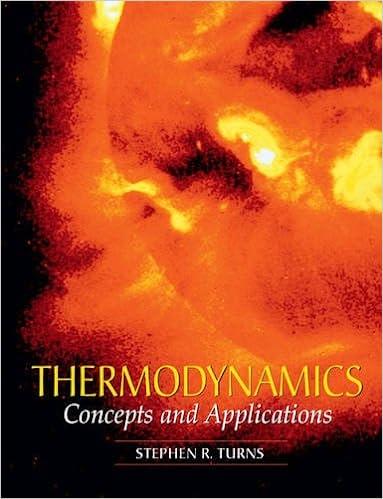Answered step by step
Verified Expert Solution
Question
1 Approved Answer
Problem 1 . You juat got a new position at a company called SemiSensing, where you are now a junior engineer in the chemical vapor
Problem You juat got a new position at a company called SemiSensing, where you are now a
junior engineer in the chemical vapor depoaition epitaxy division. Because you have a degree
in Chemical Engineering from UCR, they are going to ask you to modify the setup within the first
six months with the possibility of promotion when the division head retires. This first week you
are asaigned to shadow the other engineer and get a feel for the process. They make sensors
out of ptype semiconductors also known as transiators SemiSensor builds the chip itself, by
doping B ontointo a Si substrate. A layer of elemental boron acoumulates on the
mirrorpolished silicon substrate in a small cell and diffuses into the Si lattice, replacing some Si
with and thus oreating the desired material properties. The application is deteotion of
acetaminophen in blood, something that SemiSenaing has promised to deliver to Regia
Perennial, a large health system in your region.
a The boron reaches ita maximum concentration within the ailicon lattice at the surface, where
boron is continually deposited from the gas phase. We are concerned with its timedependent
diffusion into the wafer. The "solubility" of boron in the ailicon lattice the value reached at the
gassolid boundary is Convert this concentration given in or molL which is
used normally for liquids to atoms of elemental boron per of Si lattice. You ahould get a
high number. Round to significant figure. This is your "surface" boundary oondition for boron
concentration.
b The wafer needs an adequate concentration of boron impurity throughout the first of
depth from the surface. Reaching a larger concentration near the aurface is not the iasue. The
issue is boron is alow to diffuse and you need to know exactly how long to wait to ensure the
quality of the chip, which is inserted into the cell with no preexiating boron. The minimum
concentration at is atoms B per The density of the Si lattice is atoms
per Identify the variables and boundary conditions given and write out the appropriate
equation.
c You need to make two batches of chips per hours. Half an hour is set aside for 'aetup.
leaving you with about hour of actual diffusion time. How long does boron have to diffuse into
the silicon in each batch?
d You have a few choices when it comea to the operating temperature of the aetup, and the
choice atrongly influences the diffuaivity of in The diffuaivity is given by
DABexp where and Limiting the diffusion
time to minutes, at what temperature in Kelvin ahould you operate the reactor to achieve the
minimum concentration, at a depth of of atoma per
e Conaider the implications of inadequate sensor accuracy. Discusa the sources of error in this
manufacturing process and the potential ramifications of certifying faulty aensors. What kinds
of statistica will you include with the calibration certificate that your sensor ships with? Short
answer

Step by Step Solution
There are 3 Steps involved in it
Step: 1

Get Instant Access to Expert-Tailored Solutions
See step-by-step solutions with expert insights and AI powered tools for academic success
Step: 2

Step: 3

Ace Your Homework with AI
Get the answers you need in no time with our AI-driven, step-by-step assistance
Get Started


